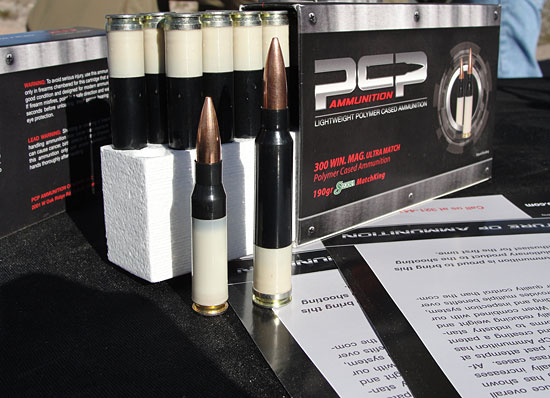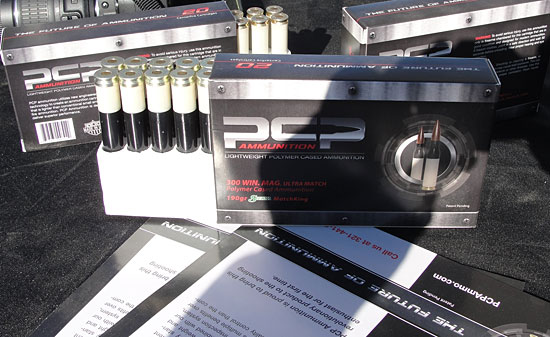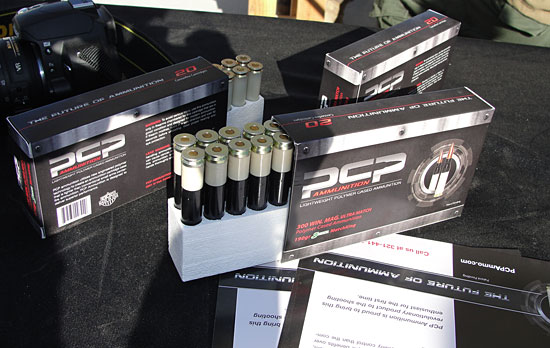As of December 2013, PCP Ammunition announced they are ready to start commercial sales of a polymer-cased .308 Win round. The new ammo will use a 168 grain Sierra MatchKing HPBT bullet, by far the preferred bullet for law enforcement snipers. Additional specifications have not yet been released. The following is the original article we wrote on the ammo from the 2012 SHOT Show.
One of the most interesting ammunition vendors at Media Day 2012 was PCP Ammunition, out of Reston, Virginia. What immediately strikes the eye is the multi-colored casings. What those colors mean may very well revolutionize the way we shoot in the future.
PCP Ammunition is now offering Match Grade ammunition using polymer cases and top-quality bullets from Sierra, Barnes, and Berger. In addition to reducing overall cartridge weight by 30%, PCP claims that the new polymer casings actually increase accuracy across the board in the different cartridges it manufactures. The revolutionary polymer case design has a patent-pending.
PCP’s literature states that the company created a revolutionary loading and inspection system that far surpasses anything available in the world. The company uses ‘best in class’ loading equipment and integrates this with a fully automated loading, primer, and bullet sealing system. The system continues to an ‘every round’ quality control process that uses machine vision to verify that the cartridges have the correct appearance, sealing, and dimensions.
PCP states that this patent-pending technology is based upon the latest military brass sorting and inspection system. These cartridges are designed to meet SAAMI specifications in dimension and pressure.
The development of a polymer casing is huge to the ammunition industry for several reasons. First, as we’ve seen in recent years, ammunition costs have been much more volatile with the rise and fall of the precious metals market.

Second, for anyone who has to carry a lot of ammunition or carry ammunition long distances, weight becomes a critical consideration. Humping a few hundred rounds up and down some mountain in Afghanistan sucks, and lightening the load would be a welcome relief for many a soldier or Marine.
A 30% reduction is huge! Even if you don’t carry or haul a large amount of ammunition, the reduced weight should have a big impact on ammunition prices due to the saved costs from buying metals, and the reduced shipping costs due to lighter weights.
Third, the reducing or elimination of heat transfer to ejected casings has big implications for military and law enforcement shooters who often are firing multiple rounds in close proximity to other shooters.
Finally, if, as PCP claims, the polymer casing can seal better in the chamber during firing this could result in a more consistent discharge of the bullet at maximum pressure and resulting in greater velocity and accuracy.
I got to talk with PCP Senior Adviser, Pete Forras, at Media Day and he provided me with some interesting information on a very interesting new development in ammunition.
In addition to being 1/3 lighter than traditional brass-cased cartridges, the polymer cartridges have little or no heat transfer. What this means is that as multiple rounds are fired through a rifle (currently PCP only makes rifle ammunition) and the barrel heats up, the heat will not transfer to the casings that enter the chamber.
Forras told me that, in essence, you could catch a polymer casing in your hand that had been fired through a barrel with hundreds of rounds through it in a short amount of time. Having been on the receiving end of burning brass many times this is definitely a benefit of polymer casings!
Forras explained the science behind the polymer. When a cartridge is fired the brass casing expands slightly outward engaging the chamber and then releasing the bullet from the pressure that’s built up. According to Forras, brass casings often do not completely engage the chamber due to minor deficiencies in the casing or wear in the chamber. This causes the release of the bullet before or after maximum pressure is reached, which causes differences in velocity and ultimately accuracy.
The PCP polymer casings are designed to completely expand and engage the interior of the chamber to maximize the pressure of the cartridge during firing. The bullet leaves at the ideal pressure which increases velocity and accuracy.
Foras stated that PCP has conducted it’s own tests and discovered an increase of 65-75 fps consistently across all their different cartridge calibers.
Currently PCP Ammunition has polymer cased cartridges in the following calibers:
- 5.56 mm
- .308 Winchester
- 6.8 mm
- .300 Win Mag
- .338 Lapua
- .50 BMG
According to Forras, the prices of each caliber will correspond approximately with the prices of premium brass cased ammunition. However, Forras did say that PCP is currently seeking contracts with the military. If those contracts go through, Forras said that production will increase and the price will go down.

I was able to fire some PCP .308 Winchester ammunition at Media Day. I was able to hit a steel target at 100 yards with no problem, and the recoil seemed to be less than traditional ammunition. The casings did not jam, or become disfigured upon ejection after firing. With their casings topped with Sierra, Barnes, and Berger bullets I’m excited to do more testing of these cartridges under more controlled circumstances than Media Day allows.
Forras advised that the PCP polymer cased ammunition will be ready for commercial sales in March 2012. I plan on buying a few cases in 5.56 mm and .308 Winchester to test on the rifles I own and use. I’ll let you know how it turns out and write a full PCP ammo review.
Last Updated: May 27, 2022

16 replies on “PCP Ammunition: Polymer Cased Ammo”
Presumably not reloadable.
Correct 9mmLargo! For now at least. The advancements in polymer technology has made this ammunition possible. A rep told me that the polymer is designed to meet or exceed the tolerances of the metal cases, but fell short of endorsing reloads. It might have something to do with there being two cases joined together to make one.
The single-use aspect isn’t a problem, as long as the buyer knows it. I only asked because none of the recent press coverage mentions it.
It’s also not surprising. Other non-brass cases, like steel and aluminum, are generally not reloadable either.
Brass is only reloadable due to the modest and predictable work hardening associated with its ductility and malleability. Plastics tend to be not very plastic in this regard :).
Evidently PCP injection-molds the upper case with the bullet already in place. That pretty much says: single use.
Thanks for the added insight 9mmLargo! Despite its singular use these cartridges still offer some benefits that shooters may want to take advantage of.
I’m particularly interested in the claim that the polymer has a complete and better seal on the bore during firing than the brass/metal casings. That seal is supposed to increase velocity 65-75 fps across the board on cartridges. I also like the thought of carrying lighter weight ammunition when I’m in my police function. I’m interested in anything that reduces the 50-70 extra pounds I carry on a call-out. And like I said above, shooting the .308 cartridges seemed to have less recoil than what I’m used to. Perhaps that was the rifle, although I shoot the G&A Rock, which is a heavy framed and heavy barrel sniper rifle. Or perhaps the better seal allows more energy to go out the barrel instead of backwards.
Thanks again for the comments.
What an interesting concept – it boggles the mind as to what this could lead to. Good article, thanks for sharing.